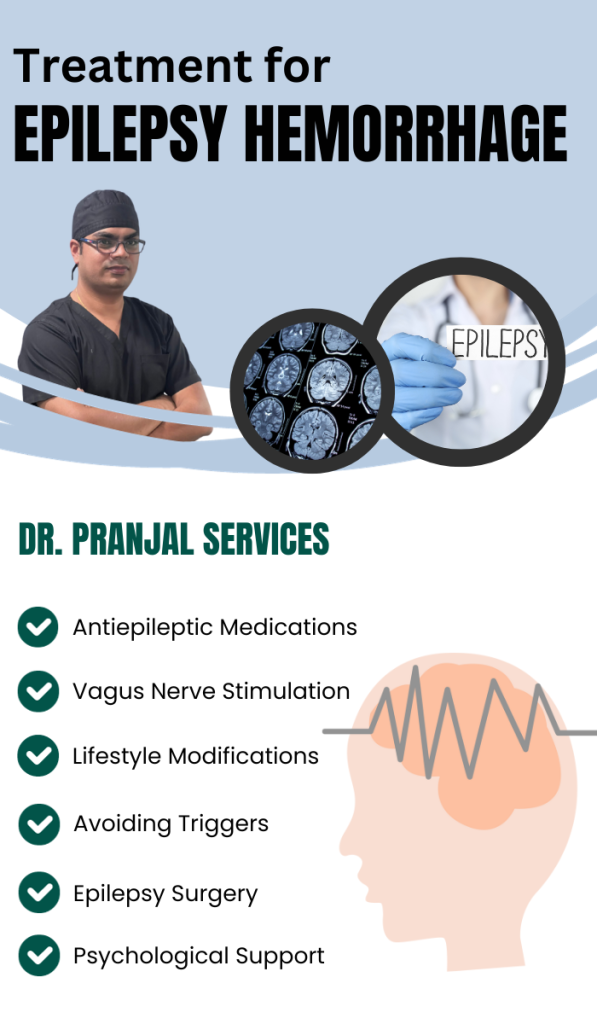Dr. Pranjal Pandey
MBBS, MS (General Surgery), M.Ch. Neurosurgery
A neurosurgeon with over 15 Yrs. years of experience
Awarded as the best resident in Neurosurgery and was a regional & zonal winner at TYSA neurosurgery
Contact Details
ADDRESS: J-203, Basement, Block J, Saket, New Delhi, Delhi 110017, India
PHONE: +91-8800924351
EMAIL: info@drpranjal.com
WORKING DAYS/HOURS: Mon-Sun: 9:00 AM - 8:00 PM

What is Epilepsy?
Abnormal firing of nerve cells in the brain can cause elecrical stimulation of brain cells which is called a Seizure or Seizure activity . Epilepsy is or a neurologic disorder in which two or more unprovoked seizures occur 24 hours apart.
These electrical bursts affect sensations, behaviors, consciousness, and movement. Even though epilepsy has no cure yet, this condition can be managed effectively through various treatment options available by neurosurgeons with over 10 Yrs of experience Dr. Pranjal Pandey.
Notably enough, about 70% of those people experiencing epilepsy have been found to control their symptoms successfully with the use of drugs.
Seizure Symptoms
1. Sudden loss Suddenly lost of consciousness without any apparent reason
2. Muscle stiffness or rigidity
3. From time to time jerking or twitching movements in the arms, legs or other parts of the body
4. Blank episodes or staring spells
5. Being confused or disoriented
6. Changes in normal sensations such as tingling, numbness, strange scents or tastes
7. Uncontrolled bowel or urinary functions
8. Chewing motions or lip-smacking
9. Unconscious repetition

What causes Epilepsy?
There are various factors that can cause epilepsy, a neurological disorder characterized by recurrent seizures disorders.
Some of them include:
1. Genetic predisposition or specific genes might increase the chances of experiencing epilepsy while the condition can also get involved with environmental factors.
2. Scarring inside the temporal lobe referred to as mesial temporal sclerosis may result in focal seizures. This scarring disrupts normal brain function and triggers abnormal electrical activity associated with seizures.
3. Brain damages such as traumatic head injuries from accidents, falls or blows causing a person to have epilepsy when such brain tissues are affected it disrupts neuronal communication leading to increased susceptibility to seizure.
4. Various infections of the brain such as meningitis, encephalitis, cerebral abscesses and neurocysticercosis may provoke epileptic seizures through triggering inflammation or neuronal damage.
5. Diseases in body immunity which cause immune system attacks towards brain cells leads to epilepsy. Inflammations that result from this bring about seizure activities due to neuronal dysfunctions.
6. Some birth defects like focal cortical dysplasia, polymicrogyria, and tuberous sclerosis which affect brain development are among the common causes of epilepsy especially when it does not respond well to the usual treatments for this disorder.
7. Certain metabolic disorders that affect how energy is processed by the body can lead to individuals developing epilepsy. Majority of these metabolic disorders can be identified using genetic testing.
8. Abnormal structures and blood vessels within the brain including tumours, strokes, dementia and arteriovenous malformations could interfere with normal brain operations causing seizures too.
The diversity of potential causes shows how complex epilepsy disorder is; therefore individual approaches tailored at addressing these root causes is used by Dr. Pranjal Pandey for treating each case.
Role of Antiepileptic Drugs
They are also called antiseizure medications or anticonvulsants, these are drugs designed specifically to either prevent or reduce the occurrence of seizures among epileptic persons and individuals with other seizure disorders. They act by calming down the electric activity of the brain to avoid any irregular discharge that causes a seizure attack. Different categories of antiepileptic medications are in existence each having its mechanism of action and possible side effects.
Some typical examples include:
1. Carbamazepine (Tegretol)
2. Phenytoin (Dilantin)
3. Valproic acid (Depakote)
4. Lamotrigine (Lamictal)
5. Levetiracetam (Keppra)
6. Topiramate (Topamax)
7. Gabapentin (Neurontin)
8. Pregabalin (Lyrica)
9. Oxcarbazepine (Trileptal)
10. Ethosuximide (Zarontin).
These may be used alone or in combination for effective seizure disorder management and a better life for patients with epilepsy. Patients should seek guidance from health care providers when selecting the most suitable medication(s) and dose regime and also when monitoring any likely side effects from concurrent treatments.
Dr. Pranjal Pandey Epilepsy Treatment Therapies in Delhi
Vagus Nerve Stimulation (VNS) & Responsive Neurostimulation(RNS) are advanced therapies used in seizure disorder treatment, especially for those who do not respond favorably to common anti-epileptic drug regimens or who are inappropriate candidates for epilepsy surgery.
Vagus Nerve Stimulation (VNS):
Involves the insertion of a device through operation to release mild and regular electric pulses aimed at stimulating the vagus nerve located in the neck. These impulses then traverse into the brain where they can help regulate abnormal electrical activity and decrease seizure frequency and intensity. VNS is usually given as an adjunctive therapy to our patients with partial-onset seizures only partially controlled byantiepileptic medications alone. The device is adjustable by a clinician to improve its efficiency for every patient since it is programmable. Some common side effects of VNS therapy include hoarseness, cough, dysphagia, or tingling in the neck.
Responsive Neurostimulation (RNS):
The surgical implantation of a neurostimulator device directly within or near the site where seizures originate from is comprised in RNS. The neurostimulator continuously monitors the electrical activity of the brain while detecting abnormal electrocortical features that correlate with impending seizure disorder onset. Once an anomaly is detected, this appliance sends fleeting electrical pulses or stimulation currents to disrupt seizure electrophysiologic activity so that it may not spread further. RNS is person-specific depending on his or her specific seizure patterns hence modifiable over time when the need arises.
RNS is typically used by Dr. Pandey for those individuals who have partial-onset seizures and have not responded well to other neurological disorder treatments. Concerning surgery, this might involve temporary discomfort or swelling at the implant site and associated risks with surgery.
Both VNS and RNS treatments offer individuals with epilepsy who have not achieved satisfactory seizure control through medications alone some hope. However, Dr. Prajnal’s careful assessment as well as regular review by multidisciplinary #1 neurologists, neurosurgeons, and epilepsy specialists in Delhi.
Why Choose Dr. Pranjal Pandey Seizure Disorder Neuro Specialist in Delhi?
Dr. Pranjal Pandey stands out as a premier epilepsy treatment specialist in Delhi, offering the best patient care and hospital experience.
Here’s why he’s the top choice:
- Cutting-edge Technology: Dr. Pandey utilizes state-of-the-art technology, all under one roof, ensuring patients receive the highest quality nuero treatment available in Delhi.
- Experienced Team: With over 10 years of experience, Dr. Pandey ensures comprehensive and expert care for all patients.
- Clinical Excellence: With a proven track record of successfully managing even the most complex cases with accuracy and precision, Dr. Pandey and his team provide tailored clinical excellence.
- Personalized Care: Each patient receives tailored treatment based on their individual needs, ensuring personalized care and optimal outcomes.
- Stringent Infection Control: Dr. Pandey prioritizes patient safety by implementing strict infection control protocols, minimizing the risk of complications and ensuring a safe treatment environment.
Patients from various locations, including Faridabad, Uttar Pradesh, Haryana, Rajasthan, Bihar, Himachal Pradesh, Punjab, and Madhya Pradesh, and other states of India choose Dr. Pandey’s expertise for epilepsy treatment in Delhi.
With his dedication to utilizing advanced technology, experienced team, and commitment to personalized care, he became the preferred choice for individuals seeking top-notch neurological care in Delhi.
If your loved ones are suffering from the same neurological disorder don’t delay and fix an appointment with Dr. Pandey today for best care.
